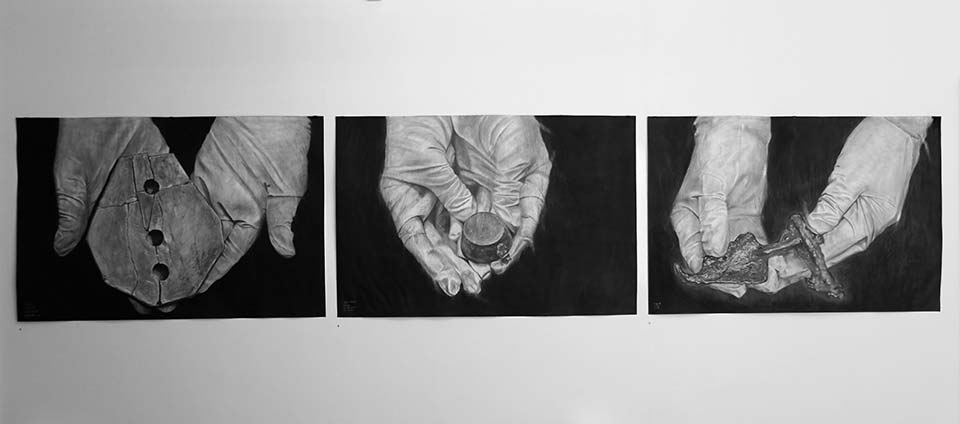Behjat Omer Abdulla
Unidentified Objects, 2015
Pencil, charcoal and graphite powder on paper
Three drawings, 100 x 150 cm each
What can mankind do when the priceless archaeological treasures from the birth of human civilization are being destroyed or converted into a source of revenue for ISIS? Not long after I started my research at Nya Lödöse , the world woke up to the destruction and looting of Nimrud, 20 miles south of the modern city of Mosul. In the Mosul Museum, ISIS smashed artefacts and statues with hammers.
After visiting the archaeological site, my first impulse was to work with the bodies found there, as most of my earlier work is about issues of displacement and identity. I could have related my work to these unknown bodies. Instead, I decided to use this opportunity to shift from the human form and work with a different subject but maintain a political approach towards the project.
The triptych drawings that I produced are drawn with pencil, charcoal and graphite powder on paper. They depict hands in a dark space, wearing white medical gloves and holding 500 to 600-year-old unidentified objects from the medieval period. They were selected because of the unknown story and the complex history of each object. By converting the images from photographs to drawings (a large part of my practice), I want to encourage a shift in the viewer’s understanding of the subject.
Artist’s biography
Behjat Omer Abdulla is a Kurdish artist and adjunct lecturer at the Valand Academy, Gothenburg University. He was educated in Kurdistan, Iraq, Staffordshire University, UK, and the Valand Academy, Gothenburg University. He works with mixed media, mainly drawing, photography and video installation. Through his art, he conveys feelings and stories about war, often through individual destinies and with a focus on experiences that can hardly be explained or shared. His projects create visualizations of war, refugee experiences and living conditions, provoking reflection and sparking debate. Behjat has participated in a number of exhibitions internationally, including at the Tate Modern and the Southbank Centre in London and at the Drone Vision exhibition at the Hasselblad Center in Gothenburg. Behjat Omer Abdulla lives and works in Sweden.



